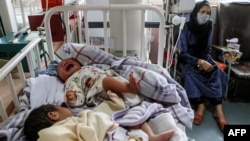The United States said Friday it had “assessed” that Islamic State was behind deadly attacks on a maternity clinic and a funeral earlier this week in Afghanistan.
“ISIS has demonstrated a pattern for favoring these types of heinous attacks against civilians and is a threat to the Afghan people and to the world,” tweeted Zalmay Khalilzad, the American peace envoy for the country. He used an acronym for the Middle East-based terrorist organization.
The attacks occurred Tuesday when several gunmen in suicide vests stormed the maternity ward in Kabul, killing 24 people. An hour later, a suicide bombing of a funeral in the eastern Afghan province of Nangarhar killed 32 and injured about 100 others.
While Islamic State claimed credit for the funeral bombing, no armed group took responsibility for the gruesome hospital raid in the Afghan capital.
The maternity ward, run by France-based Doctors Without Borders, is located in western Kabul, home mostly to members of the minority Hazara Shi’ite community.
IS has claimed responsibility for previous attacks on Hazara rallies and places of worship in the city, and elsewhere in Afghanistan.
The Taliban insurgency swiftly denied involvement in the both the attacks.
In a new statement issued Friday, it demanded an independent probe into the violence, denouncing it as “vile and “inhumane.”
“We firmly call for the transparent and impartial investigation of these attacks in order to expose the dark faces of the perpetrators of these heinous crimes and bring them to justice,” it said.
However, Afghan President Ashraf Ghani and his aides accused the Taliban of playing a role in the bloodshed, citing its alleged ties with terrorists responsible for the violence.
Khalilzad noted in his tweets that Islamic State has sought to encourage a sectarian war in Afghanistan, as it did in Iraq and Syria. He said the terrorist group was also opposed to a peace agreement between the Afghan government and the Taliban, he added.
“Rather than falling into the ISIS trap and delay peace or create obstacles, Afghans must come together to crush this menace and pursue a historic peace opportunity. No more excuses. Afghans, and the world, deserve better,” the U.S. envoy said.
MSF account of hospital attack
Meanwhile, Doctors Without Borders, known by its French acronym MSF, Thursday released details of its own investigation into the attack on the maternity ward in Kabul. It said that the assailants killed 11 women, three of them in the delivery room with their unborn babies, and that five others were injured.
“I went back the day after the attack and what I saw in the maternity (ward) demonstrates it was a systematic shooting of the mothers,” said Frederic Bonnot, MSF’s head of programs in Afghanistan.
“They went through the rooms in the maternity (ward), shooting women in their beds. It was methodical. Walls sprayed with bullets, blood on the floors in the rooms, vehicles burnt out and windows shot through.”
Two young boys and an Afghan midwife working with MSF were among the dead, while three local staff and two newborn babies were also wounded.
The MSF probe found the gunmen stormed the hospital through the main gate and moved straight to the maternity ward.
The attack lasted for four hours, while patients and staff alike searched desperately for cover, according to the MSF statement.
“It’s shocking. We know this area has suffered attacks in the past, but no one could believe they would attack a maternity. They came to kill the mothers,” said Bonnot.
US-Taliban deal
Khalilzad negotiated and signed Washington’s landmark peace-building agreement with the Taliban in February to end the nearly 19-year Afghan war and bring home American troops.
Tuesday’s violence prompted Ghani to order Afghan security forces to resume “offensive” operations against “Taliban and other terrorist groups.” The move fueled fears of an escalation in the Afghan war, posing a fresh challenge to the U.S.-Taliban pact.
The Trump administration, however, has stopped short of endorsing Kabul’s war plans, urging Afghan and Taliban leaders to cooperate in fighting the “common enemy" of terrorism and in advancing the peace process.
The Feb. 29 U.S.-Taliban deal called for a phased U.S. troop withdrawal from Afghanistan. It also binds Taliban insurgents to engage in negotiations with other Afghan groups in the country to negotiate a cease-fire and power-sharing arrangement.
However, the proposed intra-Afghan talks, which were supposed to begin in March, have been delayed because of a slow-moving prisoner swap between Kabul and the Taliban.
The agreement calls for the Afghan government to release 5,000 insurgent prisoners in exchange for its 1,000 personnel being held by the Taliban. So far, 1,000 detainees have been set free from Afghan jails and the Taliban has released fewer than 300 Afghan forces.




